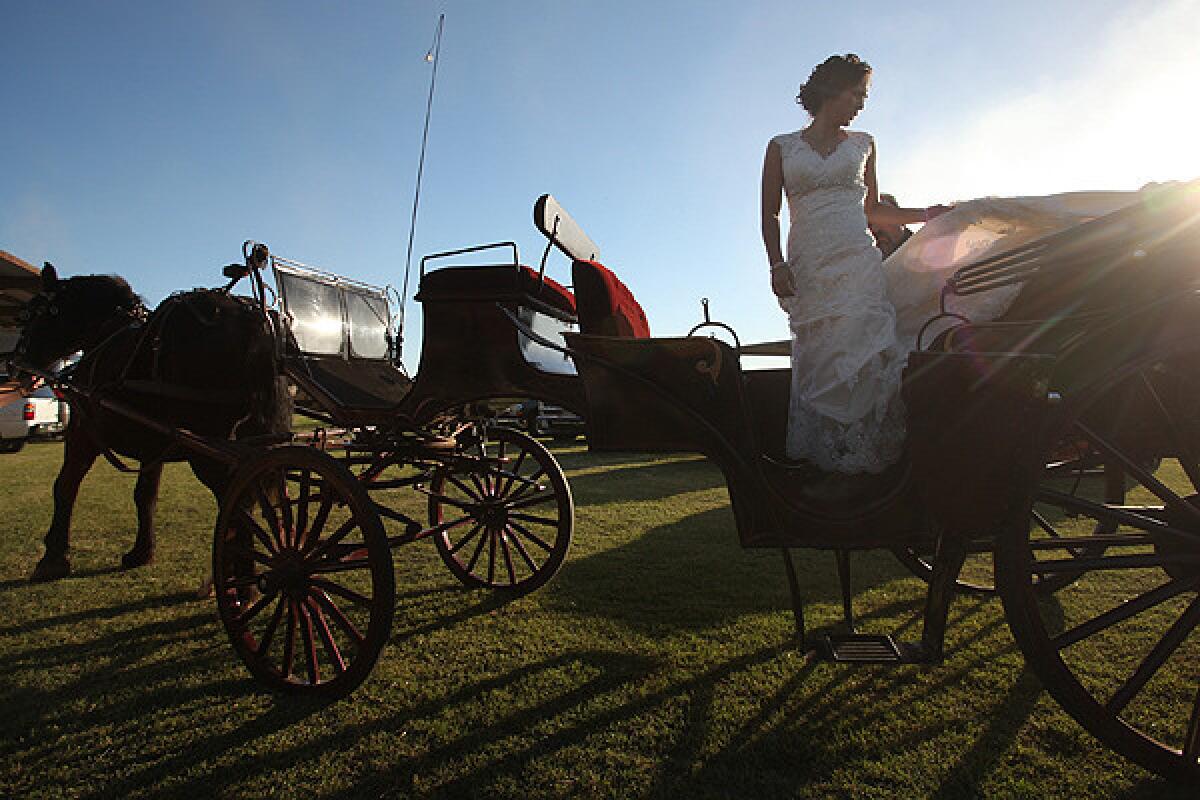Memories of beloved pets live on at cemetery
Los Angeles Pet Memorial Park, one of the largest and oldest of its kind on the West Coast, offers bereaved pet owners a sense of community.
- Share via
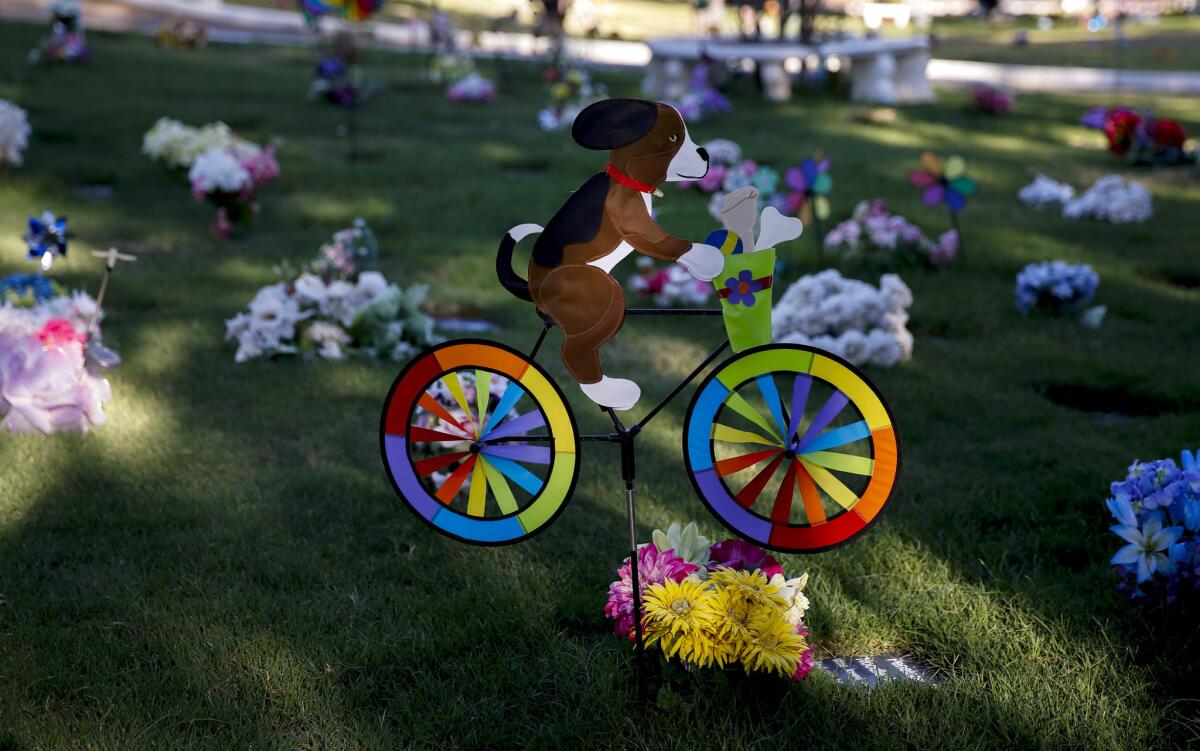
Jazz, a cocker spaniel with curly black hair, has died. He was 13 years old.
He succumbed to heart disease and old age at an animal hospital in Studio City.
A 24-pound dog who confronted bull mastiffs and Rottweilers twice his size, Jazz was remembered by his family as a flop-eared hunter known to terrorize cats with an unblinking stare.
He is survived by Greg Poland, his wife, Shelly, and their 4-year-old daughter, Ameera. Funeral services were held at the Los Angeles Pet Memorial Park in Calabasas.
Sheets of blue film cover the windows of the viewing room at the Calabasas graveyard, casting an eerie glow over the Poland funeral party. A jug of water and a glass bowl of brown cookies — for man or animal, it's unclear — sit untouched.
Sitting on a bench beneath a holographic dog portrait, Shelly Poland writes a letter to Jazz.
Jazz was really his wife's dog, Greg says. He never wanted a pet and when Jazz died, Greg floated the idea of burying him in the backyard, a suggestion quickly withdrawn.
But Greg was one of Jazz's primary caretakers. He took the dog for walks, hollered at him during potty training, laughed when Jazz challenged bigger dogs. He indignantly recalls how the family learned of their dog's death from the groomers' where Jazz had collapsed.
"The guy …was like, 'Sir, your dog is dead' — like he was telling me my cheeseburger was ready," he says.
Shelly finishes the letter and places it in the casket. The party gathers around Jazz, who rests in a pebbled gray plastic casket lined with crushed blue velvet.
Ameera takes a plastic cup full of water and places it next to Jazz's head, his last drink. Shelly clips some of Jazz's fur as a memento and puts it in a zip-lock bag. Artemio Cristerna, the cemetery's longtime groundskeeper, closes the casket. It's time to leave, but Shelly cannot. She rushes back to the viewing room, cracks open the casket, and whispers.
"Bye, Jazzy."

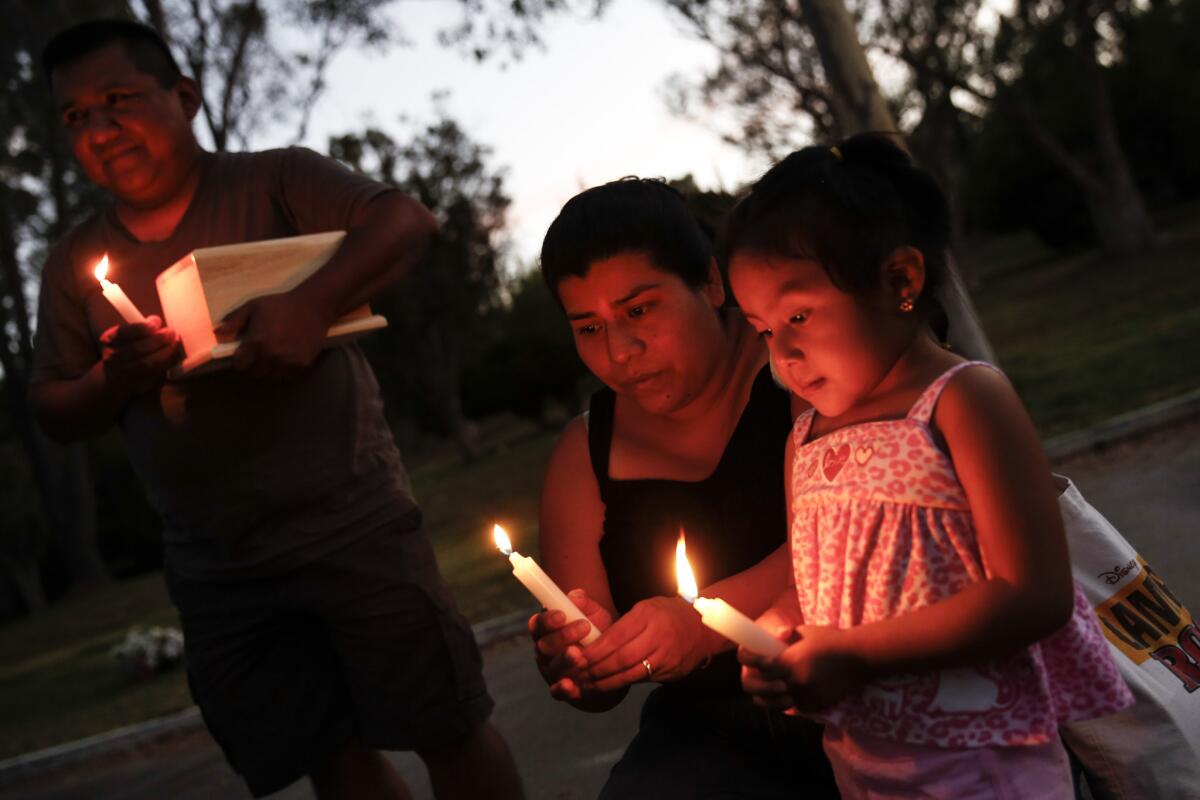
Nayo Mateo, left, holds the cremated remains of his family's dog, Maru, as his wife, Marce, and their daughter Lucie, 2, join him at a candlelight memorial service at Los Angeles Pet Memorial Park and Crematory. More photos
A printer on cemetery manager Emad Whitney's desk drones out some paperwork as a cat owner begins to cry.
"She used to love pizza," she says, choking up.
Whitney looks sympathetic and nods.
"It never gets any easier," Whitney says, and talks about losing his own pet.
Another day dawns at the Los Angeles Pet Memorial Park, 10 gently sloping acres in Calabasas tucked behind a Ferrari dealership and an office complex.
The cemetery was founded in 1928 by celebrity veterinarian Dr. Eugene Jones as the final resting place for animals of stars and the starring animals themselves, including MGM's lion and the dog from "Little Rascals."
With more than 40,000 pets interred, the graveyard is one of the largest and oldest of its kind on the West Coast. There's a crematory, some offices and a shop selling urns, headstones and coffins. The small staff connects grievers to florists, priests and rabbis. Depending on the size of the plot and the quality of the casket, burial can cost $600 to $2,000.
This is for Sancho. I miss him very much."
The cemetery is now run by a group named SOPHIE (Save Our Pets' History in Eternity). About 500 members contribute annually to keep the cemetery running. It now stands as a permanent sanctuary for a grief that is often misunderstood, Whitney says.
Pet owners experience a kind of disenfranchised grief, says Dr. Wallace Sife, chief executive of the Assn. for Pet Loss and Bereavement and author of the 2005 book "The Loss of a Pet."
The bond between human and animal can be intense and intimate in a way that human relationships cannot, like caring for a child who never grows up, Sife says. But most people hesitate to place the grief of a pet owner on the same level as that of someone who has lost a mother or child.
The mourning process can be isolating. Non-pet owners can be unsympathetic: Some will say, get over it, or just get a new one.
Through the Internet and organizations such as Sife's, bereaved pet owners have found a community.
"Pet owners are coming out of the closet," Sife says.
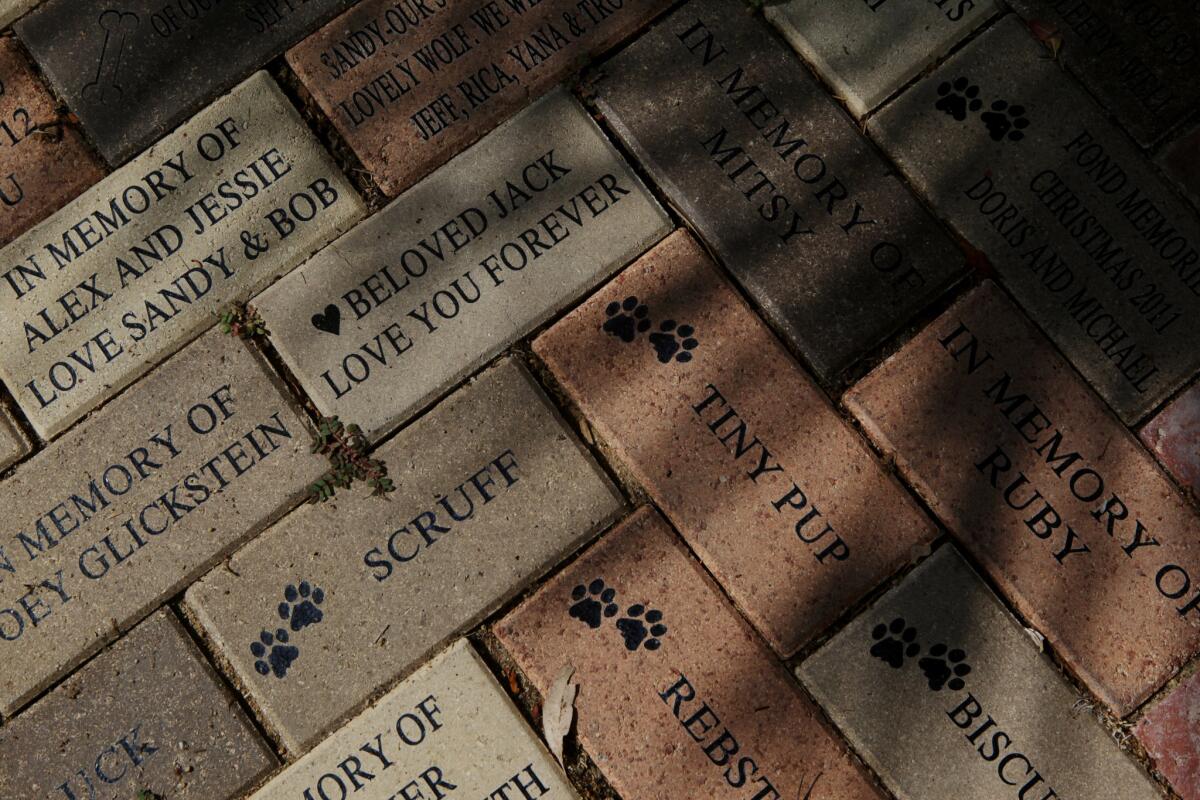
Owners who bring their pets to be buried or cremated often wish to leave messages and names on bricks at the cemetery. (Spencer Bakalar / Los Angeles Times) More photos
They form support groups, gather in chat rooms, commission animal obituaries and seek the services of pet bereavement counselors — all the traditional ways of dealing with grief.
At the end of every month, a few gather for a twilight candlelight vigil at the Calabasas pet cemetery.

Sancho, an orange tabby cat, has died. He was 10 years old.
He was mauled by a neighbor's black pit bull in the courtyard of his family's apartment complex in August.
Family members remembered Sancho as an insistent, affectionate cat who cultivated rich social relationships and firmly believed that he was a dog. He followed 9-year-old Luisito Meza around during the day, did tricks on command, and slept in the boy's bed at night.
He is survived by Luisito, his mother, his grandfather, a cat named Tasha, a bearded dragon named Patrick and a dog, Peggy.
Sancho was more than a cat to Luisito, who was born with arthrogryposis, a condition that severely limits the use of his arms. Doctors told him he would never be able to pick up anything. When Luisito was trying to strengthen his arms, Sancho was the first object he was able to touch. He calls the cat his "way to achieve the impossible."
At one of the candlelight vigils, Luisito takes to the microphone and launches into a tearful remembrance that quickly morphs into a diatribe against his neighbor's dog. His voice trembling with outrage, he describes how his cat's claws had been ripped out, how Sancho had died in his mother's arms.
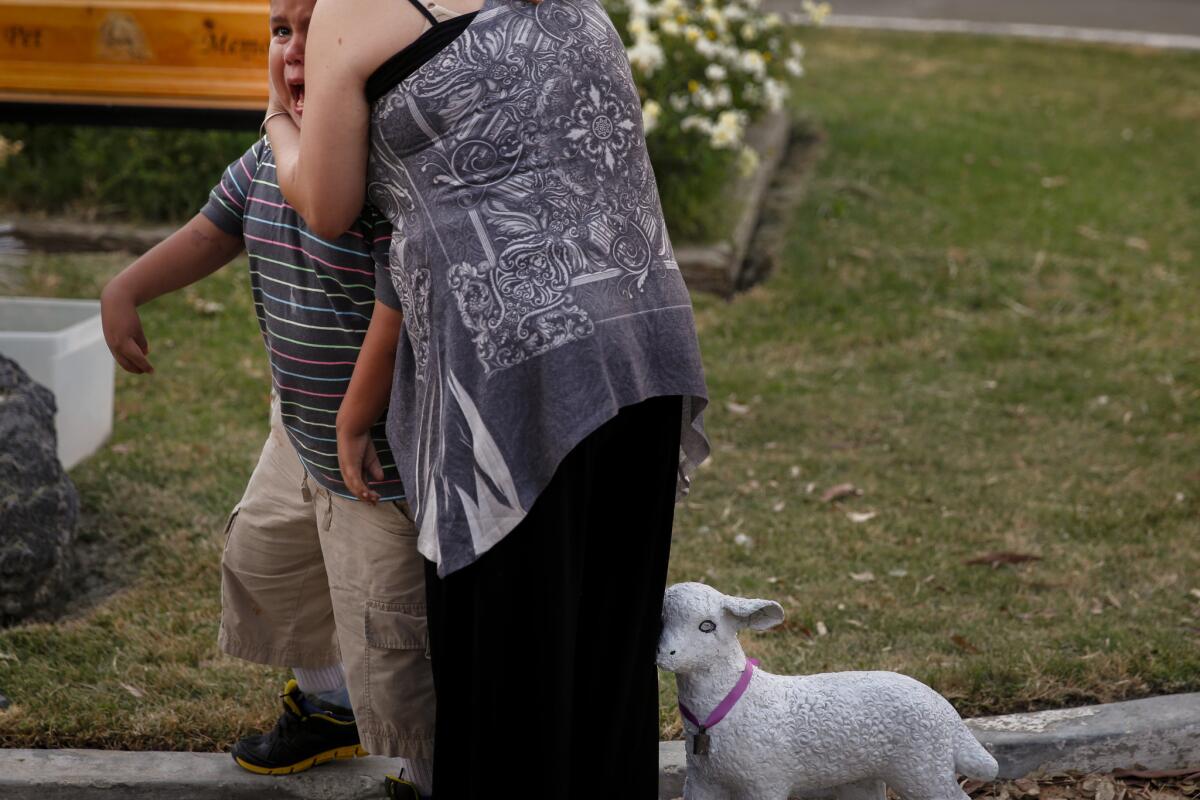
Luisito Meza, 8, of Northridge is comforted by his mother, Diane Uhri, as he gives a tearful remembrance of his cat Sancho, who was killed by a neighbor's pit bull, during a memorial at the Calabasas pet cemetery. More photos
"I am so sad. I am so scared. I miss my cat," says Luisito, his voice cracking into the microphone his mother holds for him.
After the remembrances, each pet owner rings a porcelain bell and speaks the name of their pet.
"This is for Sancho," Luisito says, tears streaming. "I miss him very much." He rings the bell himself.
Two months after Sancho's death, Luisito no longer sleeps with the polished wooden box that contained Sancho's ashes. But small reminders of his loss can interrupt his daily routine. At school he was assigned the word "mourning" for vocabulary. Recently another orange tabby began to wander his neighborhood. Luisito keeps begging his mother to adopt him.

Tootsie, a white Pekingese who weighed 9 pounds, has died. She was 13 years old.
Her family remembers Tootsie as a reserved and intelligent dog, calm enough to be smuggled into hotels and movie theaters in a purse. She died in her owner's arms at their home in Orange County.
She is survived by 63-year-old Mindi Miller, a Pekingese named Saki and another Pekingese, Angelina Jolie.
Miller — an aesthetician, former model and one of Elvis Presley's last girlfriends — had a bond with Tootsie that she cannot describe as anything but spiritual.
White Pekingese have a reputation as being yappy, but Tootsie was different, Miller said. If a stranger petted her, or another dog approached, she would pause a beat before reacting, as if she were thinking things over.
She remained unruffled on 9/11, when she and Miller had to get out of Washington, D.C., by bus. On the long, frightening ride home, Tootsie kept them both calm, never barking, never whining, quietly eating hamburgers at rest stops.
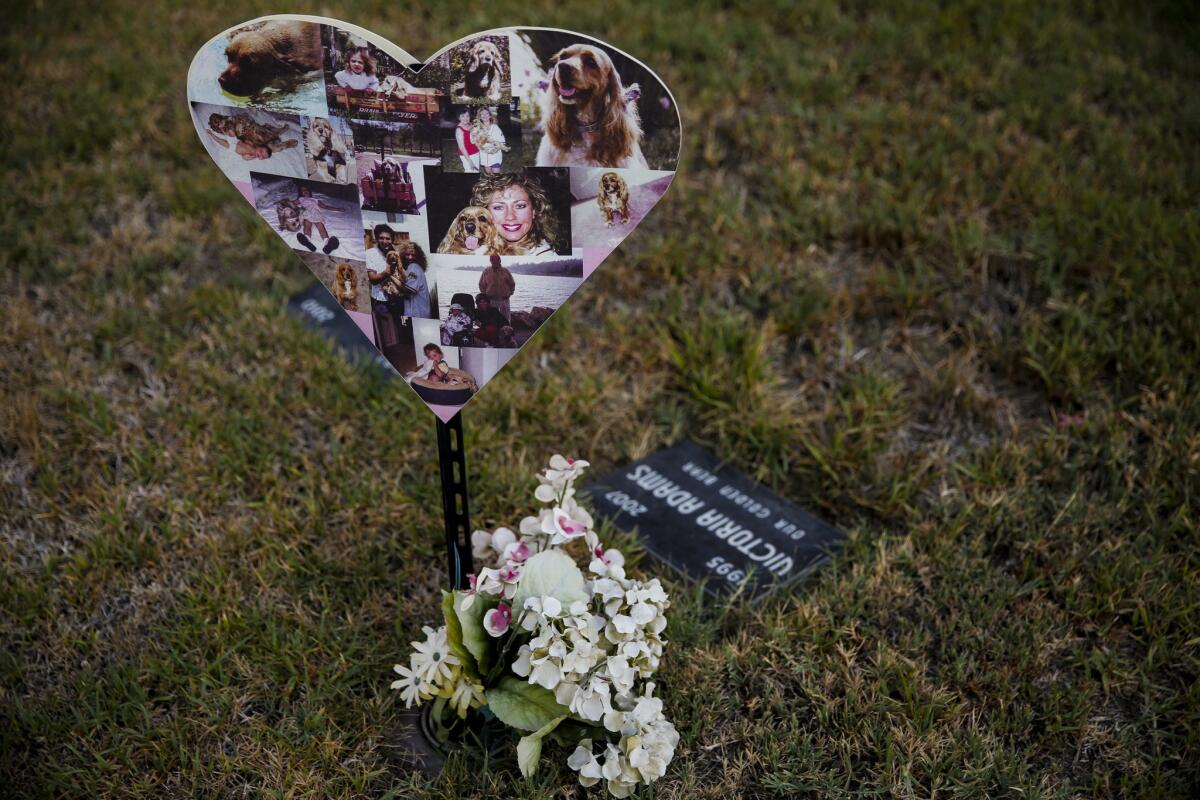
Photos and flowers adorn a gravesite at the pet cemetery. It has a crematory, some offices and a shop selling urns, headstones and coffins. More photos
"She saved me from going absolutely insane," Miller said.
Tootsie died in November after a long health battle that cost Miller nearly $1,000.
At the time, Miller was financially unable to pay for a funeral. And she couldn't bear the thought of saying goodbye. Tootsie's body remained in cold storage at the Calabasas cemetery for nearly a year.
A few weeks ago, Miller decided she was ready.
She prepared a white casket, white flowers, a white dress with white shoes and a white clip for her hair. She found poems, prayers and passages from her favorite writers that expressed what she could not. She put together a playlist with specific songs to accompany each reading — no Elvis, but a few songs with Celtic and Middle Eastern themes.
On a Tuesday afternoon, Miller and a friend buried Tootsie on a spot high on the hill at the Los Angeles Pet Memorial Park. They tied messages to silver balloons and released them into the air.
"Here's an animal that you spent so much time with, who was your best friend. I just wanted to send her off in the way I felt was most proper and honorable. I wanted to thank her," Miller says.
Miller does not plan to get another Pekingese.
"People will say, what a crazy woman, what an eccentric, she was single, she had no children, she became dependent," Miller says. "But there's a reason people do things, if you're interested enough to find out why."
Follow Frank Shyong (@frankshyong) on Twitter
Sign up for Essential California
The most important California stories and recommendations in your inbox every morning.
You may occasionally receive promotional content from the Los Angeles Times.
